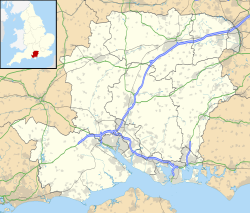Queen Elizabeth Barracks, Church Crookham
| Queen Elizabeth Barracks | |
|---|---|
| Church Crookham | |
 The main administration building, now known as the "Boyce Building" | |
| Coordinates | 51°15′16″N 0°49′52″W / 51.2544°N 0.8312°W |
| Type | Barracks |
| Site information | |
| Owner | Ministry of Defence |
| Operator | |
| Site history | |
| Built | 1938 |
| Built for | War Office |
| In use | 1938-2000 |
Queen Elizabeth Barracks was a military installation at Church Crookham, Hampshire, England.
History
[edit]The barracks, which were originally known as Boyce Barracks after Major William Wallace Boyce, DSO, RAMC,[1] were built as a training depot for the Royal Army Medical Corps in 1938.[2][3] The barracks were renamed Queen Elizabeth Barracks following a visit by Queen Elizabeth in 1948.[2] The wooden hutted camp, with barrack blocks arranged as 'spiders', could accommodate 2,500 soldiers.[2]
Between January 1963 and January 2003, 9 Parachute Squadron, Royal Engineers was based at Haig Lines.[4]
The Royal Army Medical Corps moved their depot to Keogh Barracks in 1964[3] and were replaced by training regiments of the Royal Corps of Transport in 1965 and by the Gurkha Regiments in 1970.[2] After the Gurkha Regiments left in 2000, the site was decommissioned and acquired by Bryant Homes in 2002.[2] It was initially renamed Khukri Park, but following acquisition by Taylor Wimpey, it was renamed Crookham Park.[5] The main administration building was moved to the Aldershot Military Museum.[6]
References
[edit]- ^ "Major William Wallace Boyce, DSO, RAMC". Malta RAMC. Retrieved 3 June 2018.
- ^ a b c d e Quent, Karl. "What's under the earth we dig" (PDF). Church Crookham Allotments Association. Retrieved 3 June 2018.
- ^ a b "ASU Building, QE Barracks, Church Crookham" (PDF). Oxford Archaeology. p. 3. Retrieved 3 June 2018.
- ^ "British Army units from 1945 on - 9 Squadron". british-army-units1945on.co.uk. Retrieved 6 April 2021.
- ^ Taylor Woodrow (2002). "Bryant Acquires Major Brownfield Development Site". Archived from the original on 12 May 2006. Retrieved 28 November 2006.
- ^ "Wartime Barracks Saved And Moved To Aldershot Military Museum". Culture 24. 16 November 2006. Retrieved 3 June 2018.

